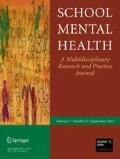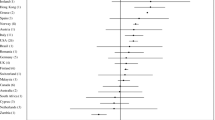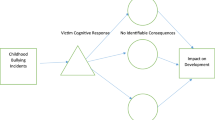Abstract
Bullying involvement tends to bring about greater mental health problems among school-aged youths, and research suggests that empathy and attachment may play crucial roles in mitigating these adverse consequences. However, little is known about how different types of bullying involvement continue to contribute to mental health in higher education. This study fills the knowledge gap by examining how empathy and attachment moderate the relationship between the patterns of bullying involvement and depressive and anxiety symptoms among Singaporean university students. A total of 835 students (aged 21–24) from a public university completed an online survey. Using latent class analysis, a four-class typology was uncovered, consisting of high/multiple bully–victims, cyberbully–victims, relational and verbal victims, and persons uninvolved in bullying involvement. Multiple regression analyses showed that high/multiple bully–victims, cyberbully–victims, and relational and verbal victims tended to experience elevated depressive or anxiety symptoms compared to those who were uninvolved. Two 2-way interactions involving empathy and attachment were found: Compared to the uninvolved, being high/multiple bully–victims and having low empathy were associated with greater anxiety symptoms, and being cyberbully–victims with poor peer attachment was linked to greater anxiety symptoms. These differences in anxiety between the uninvolved and high/multiple and cyberbully–victims were non-significant at medium and high levels of empathy and at high levels of peer attachment, respectively. In order to improve the mental health of school-aged youths, practitioners should employ not only specific bullying prevention–intervention programs but also empathy- and peer-based programs.


Similar content being viewed by others
References
Armsden, G., & Greenberg, M. (1987). The inventory of parent and peer attachment: Individual differences and their relationship to psychological well-being in adolescence. Journal of Youth Adolescence, 16(5), 427–454. https://doi.org/10.1007/BF02202939.
Arseneault, L., Bowes, L., & Shakoor, S. (2010). Bullying victimization in youths and mental health problems: Much ado about nothing? Psychological Medicine, 40(5), 717–729. https://doi.org/10.1017/S0033291709991383.
Beck, A. T., Epstein, N., Brown, G., & Steer, R. A. (1988). An inventory for measuring clinical anxiety: Psychometric properties. Journal of Consulting and Clinical Psychology, 56(6), 893–897. https://doi.org/10.1037/0022-006X.56.6.893.
Bennett, D. A. (2001). How can I deal with missing data in my study? Australian and New Zealand Journal of Public Health, 25(5), 464–469. https://doi.org/10.1111/j.1467-842X.2001.tb00294.x.
Beran, T. N., Rinaldi, C., Bickham, D. S., & Rich, M. (2012). Evidence for the need to support adolescents dealing with harassment and cyber harassment: Prevalence, progression and impact. School Psychology International, 33(5), 562–576. https://doi.org/10.1177/0143034312446976.
Bonanno, R. A., & Hymel, S. (2013). Cyber bullying and internalizing difficulties: Above and beyond the impact of traditional forms of bullying. Journal of Youth and Adolescence, 42(5), 685–697. https://doi.org/10.1007/s10964-013-9937-1.
Brewer, G., & Kerslake, J. (2015). Cyberbullying, self-esteem, empathy, and loneliness. Computers in Human Behavior, 48, 255–260. https://doi.org/10.1016/j.chb.2015.01.073.
Brown, B. B., & Bakken, J. P. (2011). Parenting and peer relationships: Reinvigorating research on family-peer linkages in adolescence. Journal of Research on Adolescence, 21(1), 153–165. https://doi.org/10.1111/j.1532-7795.2010.00720.x.
Burton, K. A., Florell, D., & Wygant, D. B. (2013). The role of peer attachment and normative beliefs about aggression on traditional bullying and cyberbullying. Psychology in the Schools, 50(2), 103–115. https://doi.org/10.1002/pits.21663.
Campbell, M. (2016). Policies and procedures to address bullying at Australian universities. In H. Cowie & C. A. Myers (Eds.), Bullying among university students (pp. 157–171). London: Routledge.
Carleton, R. N., Thibodeau, M. A., Teale, M. J. N., Welch, P. G., Abrams, M. P., Robinson, T., & Asmundson, G. J. G. (2013). The Center for Epidemiologic Studies Depression Scale: A review with a theoretical and empirical examination of item content and factor structure. PLoS ONE, 8(3), 1–3. https://doi.org/10.1371/journal.pone.0058067.
Carnicer, J. G., & Calderón, C. (2014). Empathy and coping strategies as predictors of well-being in Spanish university students. Electronic Journal of Research in Educational Psychology, 12(1), 129–146. https://doi.org/10.14204/ejrep.32.13117.
Chang, F.-C., Lee, C.-M., Chiu, C.-H., Hsi, W.-Y., Huang, T.-F., & Pan, Y.-C. (2013). Relationships among cyberbullying, school bullying, and mental health in Taiwanese adolescents. Journal of School Health, 83(6), 454–462. https://doi.org/10.1111/josh.12050.
Cohen, S., & Wills, T. A. (1985). Stress, social support, and the buffering hypothesis. Psychological Bulletin, 98(2), 310–357. https://doi.org/10.1037/0033-2909.98.2.310.
Cowie, H. (2011). Peer support as an intervention to counteract school bullying: Listening to the children. Children and Society, 25, 287–292. https://doi.org/10.1111/j.1099-0860.2011.00375.x.
Crosslin, K., & Golman, M. (2014). “Maybe you don’t want to face it”—College students’ perceptions on cyberbullying. Computers in Human Behavior, 41, 14–20. https://doi.org/10.1016/j.chb.2014.09.007.
Dautenhahn, S., Woods, C., & Kaouri, C. (2007). Possible connections between bullying behaviour, empathy and imitation. In K. Dautenhahn & C. Nehaniv (Eds.), Models and mechanisms of imitation and social learning in robots, humans and animals: Behavioral, social and communicative dimensions (pp. 323–339). Cambridge: Cambridge University Press.
Eisenberg, N., Fabes, R. A., & Spinrad, T. L. (2006). Prosocial behaviour. In N. Eisenberg, W. Damon, & R. M. Lerner (Eds.), Handbook of child psychology: Social, emotional and personality development (6th ed., Vol. 3). New York: Wiley.
Geiser, C. (2012). Data analysis with Mplus. New York: Guilford Press.
Giang, M. T., & Graham, S. (2008). Using latent class analysis to identify aggressors and victims of peer harassment. Aggressive Behavior, 34(2), 203–213. https://doi.org/10.1002/ab.20233.
Gladden, R. M., Vivolo-Kantor, A. M., Hamburger, M. E., & Lumpkin, C. D. (2014). Bullying surveillance among youths: Uniform definitions for public health and recommended data elements, version 1.0. Atlanta, GA: National Center for Injury Prevention and Control, Centers for Disease Control and Prevention and U.S. Department of Education.
Gladstone, G. L., Parker, G. B., & Malhi, G. S. (2006). Do bullied children become anxious and depressed adults? A cross-sectional investigation of the correlates of bullying and anxious depression. The Journal of Nervous and Mental Disease, 194(3), 201–208. https://doi.org/10.1097/01.nmd.0000202491.99719.c3.
Goldweber, A., Waasdorp, T. E., & Bradshaw, C. P. (2013). Examining associations between race, urbanicity, and patterns of bullying involvement. Journal of Youth and Adolescence, 42(2), 206–219. https://doi.org/10.1007/s10964-012-9843-y.
Graf, D., Yanagida, T., & Spiel, C. (2019). Through the magnifying glass: Empathy’s differential role in preventing and promoting traditional and cyberbullying. Computers in Human Behavior, 96, 186–195. https://doi.org/10.1016/j.chb.2019.02.007.
Hemphill, S. A., Kotevski, A., & Heerde, J. A. (2015). Longitudinal associations between cyber-bullying perpetration and victimization and problem behavior and mental health problems in young Australians. International Journal of Public Health, 60(2), 227–237. https://doi.org/10.1007/s00038-014-0644-9.
Jolliffe, D., & Farrington, D. P. (2006). Development and validation of the Basic Empathy Scale. Journal of Adolescence, 29(4), 589–611. https://doi.org/10.1016/j.adolescence.2005.08.010.
Khong, J. Z., Tan, Y. R., Elliott, J. M., Fung, D. S. S., Sourander, A., & Ong, S. H. (2020). Traditional victims and cybervictims: Prevalence, overlap, and association with mental health among adolescents in Singapore. School Mental Health, 12(1), 145–155. https://doi.org/10.1007/s12310-019-09337-x.
Klomek, A. B., Marrocco, F., Kleinman, M., Schonfeld, I. S., & Gould, M. S. (2007). Bullying, depression, and suicidality in adolescents. Journal of the American Academy of Child & Adolescent Psychiatry, 46(1), 40–49. https://doi.org/10.1097/01.chi.0000242237.84925.18.
Kraft, E., & Wang, J. (2010). An exploratory study of the cyberbullying and cyberstalking experiences and factors related to victimization of students at a public liberal arts college. International Journal of Technology Ethics, 1(4), 74–91. https://doi.org/10.4018/jte.2010100106.
Lam, L. T., Rai, A., & Lam, M. K. (2019). Attachment problems in childhood and the development of anxiety in adolescents: A systematic review of longitudinal and prospective studies. Mental Health and Prevention. https://doi.org/10.1016/j.mhp.2019.02.002.
Landstedt, E., & Persson, S. (2014). Bullying, cyberbullying, and mental health in young people. Scandinavian Journal of Public Health, 42, 393–399. https://doi.org/10.1177/1403494814525004.
Lee, J. (2021). Pathways from childhood bullying victimization to young adult depressive and anxiety symptoms. Child Psychiatry & Human Development, 52, 129–140. https://doi.org/10.1007/s10578-020-00997-4.
Lee, J., Hong, J. S., Resko, S. M., & Tripodi, S. J. (2018). Face-to-face bullying, cyberbullying, and multiple forms of substance use among school-age adolescents in the USA. School Mental Health, 10(1), 12–25. https://doi.org/10.1007/s12310-017-9231-6.
Lee, J., Hong, J. S., Tan, K., Pineros-Leano, M., & Baek, S. A. (2020). Bullying victimization profiles of school-aged adolescents and associations with weight statuses: A latent class analysis. Journal of Interpersonal Violence. https://doi.org/10.1177/0886260520905087.
Lovegrove, P. J., Henry, K. L., & Slater, M. D. (2012). Examination of the predictors of latent class typologies of bullying involvement among Middle School students. Journal of School Violence, 11(1), 75–93. https://doi.org/10.1080/15388220.2011.631447.
Marraccini, M. E., Brick, L. A. D., & Weyandt, L. L. (2018). Instructor and peer bullying in college students: Distinct typologies based on Latent Class Analysis. Journal of American College Health, 66(8), 799–808. https://doi.org/10.1080/07448481.2018.1454926.
Messias, E., Kindrick, K., & Castro, J. (2014). School bullying, cyberbullying, or both: Correlates of teen suicidality in the 2011 CDC youth risk behavior survey. Comprehensive Psychiatry, 55(5), 1063–1068. https://doi.org/10.1016/j.comppsych.2014.02.005.
Modecki, K. L., Minchin, J., Harbaugh, A. G., Guerra, N. G., & Runions, K. C. (2014). Bullying prevalence across contexts: A meta-analysis measuring cyber and traditional bullying. Journal of Adolescent Health, 55(5), 602–611. https://doi.org/10.1016/j.jadohealth.2014.06.007.
Morelli, S. A., Ong, D. C., Makati, R., Jackson, M. O., & Zaki, J. (2017). Empathy and well-being correlate with centrality in different social networks. Proceedings of the National Academy of Sciences, 114(37), 9843–9847. https://doi.org/10.1073/pnas.1702155114.
Murphy, T. P., Laible, D., & Augustine, M. (2017). The influences of parent and peer attachment on bullying. Journal of Child and Family Studies, 26(5), 1388–1397. https://doi.org/10.1007/s10826-017-0663-2.
Myers, C. A., & Cowie, H. (2017). Bullying at university: The social and legal contexts of cyberbullying among university students. Journal of Cross-Cultural Psychology, 48(8), 1172–1182. https://doi.org/10.1177/0022022116684208.
Nansel, T. R., Overpeck, M., Pilla, R. S., Ruan, W. J., Simons-Morton, B., & Scheidt, P. (2001). Bullying behaviors among U.S. youth: Prevalence and association with psychosocial adjustment. JAMA, 16, 2094–2100. https://doi.org/10.1001/jama.285.16.2094.
National Union of Students. (2008). Student experience report. Retrieved October 20, 2020, from http://www.nus.org.uk/PageFiles/4017/NUS_StudentExperienceReport.pdf.
Nylund, K. L., Asparouhov, T., & Muthén, B. O. (2007). Deciding on the number of classes in latent class analysis and growth mixture modeling: A Monte Carlo simulation study. Structural Equation Modeling: A Multidisciplinary Journal, 14(4), 535–569. https://doi.org/10.1080/10705510701575396.
O’Brennan, L. M., Bradshaw, C. P., & Sawyer, A. L. (2009). Examining developmental differences in the social-emotional problems among frequent bullies, victims, and bully/victims. Psychology in the Schools, 46(2), 100–115. https://doi.org/10.1002/pits.20357.
O’Connor, L. E., Berry, J. W., Lewis, T., Mulherin, K., & Crisostomo, P. S. (2007). Empathy and depression: The moral system on overdrive. In T. Farrow & P. Woodruff (Eds.), Empathy in mental illness (pp. 49–75). New York, NY: Cambridge University Press.
Olweus, D. (1996). The revised Olweus Bully/Victim Questionnaire for students. Bergen, Norway: University of Bergen.
Patchin, J. W., & Hinduja, S. (2006). Bullies move beyond the schoolyard: A preliminary look at cyberbullying. Youth Violence and Juvenile Justice, 4(2), 148–169. https://doi.org/10.1177/1541204006286288.
Perren, S., Dooley, J., Shaw, T., & Cross, D. (2010). Bullying in school and cyberspace: Associations with depressive symptoms in Swiss and Australian adolescents. Child and Adolescent Psychiatry and Mental Health, 4(1), 28–37. https://doi.org/10.1186/1753-2000-4-28.
Pettalia, J. L., Levin, E., & Dickinson, J. (2013). Cyberbullying: Eliciting harm without consequence. Computers in Human Behavior, 29(6), 2758–2765. https://doi.org/10.1016/j.chb.2013.07.020.
Pitman, R., & Scharfe, E. (2010). Testing the function of attachment hierarchies during emerging adulthood. Personal Relationships, 17(2), 201–216. https://doi.org/10.1111/j.1475-6811.2010.01272.x.
Pörhölä, M. (2016). Do the roles of bully and victim remain stable from school to university? Theoretical considerations. In H. Cowie & C.-A. Myers (Eds.), Bullying among university students: Cross-national perspectives (pp. 35–46). Abingdon: Routledge.
Pörhölä, M., Cvancara, K., Kaal, E., Kunttu, K., Tampere, K., & Torres, M. B. (2020). Bullying in university between peers and by personnel: Cultural variation in prevalence, forms, and gender differences in four countries. Social Psychology of Education, 23, 143–169. https://doi.org/10.1007/s11218-019-09523-4.
Radloff, L. S. (1977). The CES-D scale: A self-report depression scale for research in the general population. Applied Psychological Measurement, 1, 385–401. https://doi.org/10.1177/014662167700100306.
Randall, P. (1997). Adult bullying: Perpetrators and victims. London: Routledge.
Riebel, J., Jäger, R. S., & Fischer, U. C. (2009). Cyberbullying in Germany: An exploration of prevalence, overlapping with real life bullying and coping strategies. Psychology Science Quarterly, 51(3), 298–314.
Robson, C., & Witenberg, R. T. (2013). The influence of moral disengagement, morally based self-esteem, age and gender on traditional bullying and cyberbullying. Journal of School Violence, 12(2), 211–231. https://doi.org/10.1080/15388220.2012.762921.
Roh, B. R., Yoon, Y., Kwon, A., Oh, S., Lee, S. I., Ha, K., et al. (2015). The structure of co-occurring bullying experiences and associations with suicidal behaviors in Korean adolescents. PLoS ONE, 10(11), e0143517. https://doi.org/10.1371/journal.pone.0143517.
Seaton, E., Caldwell, C., Sellers, R., & Jackson, J. (2010). An intersectional approach for understanding perceived discrimination and psychological well-being among African American and Caribbean Black youth. Developmental Psychology, 46(5), 1372–1379. https://doi.org/10.1037/a0019869.
Shu, C. M., Hsiu, H. W., & Tsair, W. C. (2017). Hospital nurses’ attitudes, negative perceptions, and negative acts regarding workplace bullying. Annals of General Psychiatry, 16(1), 1–9. https://doi.org/10.1186/s12991-017-0156-0.
Simmons, J., Bauman, S., & Ives, J. (2016). Cyberaggression among members of college fraternities and sororities in the U.S. In H. Cowie & C. A. Myers (Eds.), Bullying among university students (pp. 93–109). London: Routledge.
Simon, H. L. M., DiPlacido, J., & Conway, J. M. (2019). Attachment styles in college students and depression: The mediating role of self differentiation. Mental Health and Prevention, 13, 135–142. https://doi.org/10.1016/j.mhp.2019.01.011.
Singapore Children’s Society. (2019). Bully-free programme. Retrieved June 1, 2020, from https://bullyfree.sg/programmes/.
Singapore Ministry of Education. (2020a). Practicing cyber wellness. Retrieved June 1, 2020, from https://beta.moe.gov.sg/programmes/cyber-wellness/.
Singapore Ministry of Education. (2020b). Social and emotional learning. Retrieved June 1, 2020, from https://beta.moe.gov.sg/programmes/social-and-emotional-learning/.
Sinkkonen, H. M., Puhakka, H., & Meriläinen, M. (2014). Bullying at a university: Students’ experiences of bullying. Studies in Higher Education, 39(1), 153–165. https://doi.org/10.1080/03075079.2011.649726.
Sourander, A., Klomek, A. B., Ikonen, M., Lindroos, J., Luntamo, T., Koskelainen, M., et al. (2010). Psychosocial risk factors associated with cyberbullying among adolescents: A population-based study. Archives of General Psychiatry, 67(7), 720–728. https://doi.org/10.1001/archgenpsychiatry.2010.79.
Sun, R., Vuillier, L., Hui, B. P., & Kogan, A. (2019). Caring helps: Trait empathy is related to better coping strategies and differs in the poor versus the rich. PLoS ONE, 14(3), e0213142. https://doi.org/10.1371/journal.pone.0213142.
Tabachnick, B. G., & Fidell, L. S. (2014). Using multivariate statistics (6th ed.). Essex: Pearson Education Limited.
Tully, E., Ames, A. M., Garcia, S. E., & Donohue, M. R. (2016). Quadratic associations between empathy and depression and the moderating influence of dysregulation. The Journal of Psychology, 150(1), 15–35. https://doi.org/10.1080/00223980.2014.992382.
Umemura, T., Lacinová, L., Macek, P., & Kunnen, E. S. (2017). Longitudinal changes in emerging adults’ attachment preferences for their mother, father, friends, and romantic partner: Focusing on the start and end of romantic relationships. International Journal of Behavioral Development, 41(1), 136–142. https://doi.org/10.1177/0165025416647545.
Vassallo, S., Edwards, B., Renda, J., & Olsson, C. A. (2014). Bullying in early adolescence and antisocial behavior and depression six years later: What are the protective factors? Journal of School Violence, 13(1), 100–124. https://doi.org/10.1080/15388220.2013.840643.
Volk, A. A., Dane, A. V., & Marini, Z. A. (2014). What is bullying? A theoretical redefinition. Developmental Review, 34(4), 327–343. https://doi.org/10.1016/j.dr.2014.09.001.
Wang, J., Iannotti, R. J., & Luk, J. W. (2012). Patterns of adolescent bullying behaviors: Physical, verbal, exclusion, rumor, and cyber. Journal of School Psychology, 50(4), 521–534. https://doi.org/10.1016/j.jsp.2012.03.004.
Worsley, J. D., McIntyre, J. C., & Corcoran, R. (2019). Cyberbullying victimisation and mental distress: Testing the moderating role of attachment security, social support, and coping styles. Emotional & Behavioural Difficulties, 24, 20–35. https://doi.org/10.1080/13632752.2018.1530497.
Wright, M. F., Wachs, S., & Harper, B. D. (2018). The moderation of empathy in the longitudinal association between witnessing cyberbullying, depression and anxiety. Cyberpsychology: Journal of Psychosocial Research on Cyberspace, 12(4), 1–14. https://doi.org/10.5817/CP2018-4-6.
You, S., Lee, J., Lee, Y., & Kim, A. Y. (2015). Bullying among Korean adolescents: The role of empathy and attachment. Psychology in the Schools, 52(6), 594–606. https://doi.org/10.1002/pits.21842.
Yun, I., & Kim, S. G. (2016). Bullying among South Korean adolescents: Prevalence and association with psychological adjustment. Violence and Victims, 31(1), 167–184. https://doi.org/10.1891/0886-6708.VV-D-13-00138.
Zaborskis, A., Illionsky, G., Tesler, R., & Heinz, A. (2018). The association between cyberbullying, school bullying and suicidality among adolescents. Crisis, 40(2), 100–114. https://doi.org/10.1027/0227-5910/a000536.
Zalaquett, C., & Chatters, S. (2014). Cyberbullying in college: Frequency, characteristics and practice. SAGE Open, 4(1), 1–8. https://doi.org/10.1177/2158244014526721.
Zhang, S., Gong, M., Li, W., Wang, W., Wu, R., Guo, L., & Lu, C. (2020). Patterns of bullying victimization and associations with mental health problems in Chinese adolescents: A latent class analysis. International Journal of Environmental Research and Public Health, 17(3), 779. https://doi.org/10.3390/ijerph17030779.
Zych, I., Baldry, A. C., Farrington, D. P., & Llorent, V. J. (2019). Are children involved in cyberbullying low on empathy? A systematic review and meta-analysis of research on empathy versus different cyberbullying roles. Aggression and Violent Behavior, 45, 83–97. https://doi.org/10.1016/j.avb.2018.03.004.
Funding
This study was supported by Start-Up Grant (Grant No. R134-000-098-133) from the National University of Singapore.
Author information
Authors and Affiliations
Corresponding author
Ethics declarations
Conflict of interest
The authors declare that there is no conflict of interest.
Additional information
Publisher's Note
Springer Nature remains neutral with regard to jurisdictional claims in published maps and institutional affiliations.
Rights and permissions
About this article
Cite this article
Lee, J., Cheung, H.S., Chee, G. et al. The Moderating Roles of Empathy and Attachment on the Association Between Latent Class Typologies of Bullying Involvement and Depressive and Anxiety Symptoms in Singapore. School Mental Health 13, 518–534 (2021). https://doi.org/10.1007/s12310-021-09411-3
Accepted:
Published:
Issue Date:
DOI: https://doi.org/10.1007/s12310-021-09411-3




